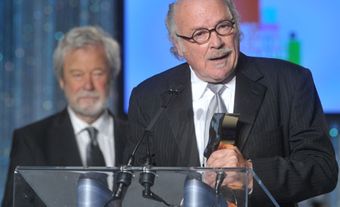
Background
The premise of Dead Ringers is derived from Bari Wood and Jack Geasland's 1977 novel, Twins, a fictionalized account of the true story of Stewart and Cyril Marcus, twin-brother gynecologists and barbiturate addicts, who were found dead in their Manhattan apartment in 1975. The film adaptation began in 1981; several screenwriters and producers were involved in the project before Cronenberg came on board.
Synopsis
Jeremy Irons plays twins Elliot and Beverly Mantle, brilliant gynecologists who specialize in fertility and are so unusually close that they routinely pretend to be each other. After they are visited by Claire Niveau (Geneviève Bujold), a famous actress with a deformed uterus, Elliot pretends to be Beverly and seduces Claire. She ends up falling for Beverly, beginning a kinky love affair with him and sharing not only her body, but also her drug habit. The drugs release the madness that has always been inside the twins and although Elliot tries to cover for Beverly, the situation rapidly spirals into drug addiction, insanity and death.
Analysis
Brilliant yet emotionally cold, Dead Ringers asks disturbing questions about the nature of individual identity and explores such themes as eroticism, narcissism, misogyny, and masculine-feminine dichotomies. Although restrained by Cronenberg standards, the film contains several brilliant set pieces. One particularly lurid touch is the Mantle clinic's operating theatre, where the doctors and nurses wear blood-red surgical masks and gowns. Beverly designs and commissions a range of special gynecological instruments for treating "mutant" women. Laid out on a trolley, his twisted creations are truly the stuff of nightmares.
Cronenberg is a master of special effects. Traditionally, when an actor plays two different characters that appear onscreen at the same time, the screen is invisibly split into two halves. When the characters talk to each other, the scene seems static or staged. In Dead Ringers, Cronenberg uses "moving splits," using computer technology to move the position of the split and the camera at the same time, thus allowing him to travel with his camera as the characters walk and talk together. The result is that Irons’ twins convincingly appear as two separate people rather than the result of trick photography.
Critical Reception
Cronenberg’s first film after the critically-acclaimed box office hit The Fly (1986), Dead Ringers was distributed widely by Twentieth Century Fox in more than 1,000 theatres across North America. It performed modestly at the box office, but was generally very well received by critics. Janet Maslin of the New York Times called the film “a startling tale of physical and psychic disintegration, pivoting on the twins' hopeless interdependence and playing havoc with the viewer's grip on reality. It's a mesmerizing achievement, as well as a terrifically unnerving one.” The Washington Post’s Desson Howe said, “Watching ‘Ringers’ is not unlike watching a critical operation — unnerving but also enthralling.”
USA Today’s Mike Clark called it “an instant classic,” and the Chicago Reader’s Jonathan Rosembaum said it was “an astonishing tour de force.” Sheila Benson of the Los Angeles Times felt the film was as “assured, unified and dizzyingly potent” as David Lynch’s Blue Velvet (1986). The Chicago Tribune’s Dave Kehr wrote that Ringers was “almost too rich in ideas for its own good: The sense of concentration and proportion isn't there. But it remains an astonishing, magnetic, devastating piece of work.”
In 2005, the Village Voice’s Michael Atkinson called the film “the keynote address” in David Cronenberg’s “discomfiting vision… Name another film that takes as many risks, runs its astonishing course with such a steady hand, and has as much to say about brotherhood and corporeal transience.”
Honours and Legacy
Generally regarded as Cronenberg's best film, Dead Ringers won 10 Genie Awards, including best picture, director, adapted screenplay and actor. It also received wide acclaim for Jeremy Irons’ performance, which won best actor honours from the Los Angeles, Chicago and New York Film Critics Associations.
The film’s reputation has grown considerably over the years. The film was not included in a list of the Top 10 Canadian films of all time compiled by TIFF in 1993, but it was ranked No. 6 and No. 7 in lists compiled in 2004 and 2015, respectively. It was also ranked No. 95 in Rolling Stone’s 1999 list of “100 maverick movies,” No. 20 in Entertainment Weekly’s 1999 list of the “25 scariest movies of all time” and No. 34 in Total Film’s list of “Top 50 horror movies.”
In 2007, Dead Ringers was ranked No. 22 in Premiere magazine’s list of the “25 most dangerous movies ever made,” defined as “galvanizing experiences that place squarely in your face all the stuff Hollywood usually presumes you go to the movies to get away from… Consciousness-expanders, in other words, but rarely in a pleasant way.” In 2016, it was named one of 150 essential works in Canadian cinema history in a poll of 200 media professionals conducted by TIFF, Library and Archives Canada, the Cinémathèque québécoise and The Cinematheque in Vancouver in anticipation of the Canada 150 celebrations in 2017.
See also:Canadian Feature Films; The History of the Canadian Film Industry.
Awards
1989 Genie Awards
Achievement in Direction (David Cronenberg)
Best Achievement in Art Direction/Production Design (Carol Spier)
Best Achievement in Cinematography (Peter Suschitzky)
Best Achievement in Film Editing (Ronald Sanders)
Best Achievement in Overall Sound (Bryan Day, Don White, Andy Nelson)
Best Achievement in Sound Editing (Terry Burke, Wayne Griffin, David Evans, Rick Cadger, David Giammarco)
Best Adapted Screenplay (Norman Snider, David Cronenberg)
Best Motion Picture (Marc Boyman, David Cronenberg)
Best Music Score (Howard Shore)
Performance by an Actor in a Leading Role (Jeremy Irons)
Others
Best Actor (Jeremy Irons), New York Film Critics Circle Awards (1988)
C.S.T. Award, Avoriaz Fantastic Film Festival (1989)
Grand Prize, Avoriaz Fantastic Film Festival (1989)
Best Actor (Jeremy Irons), Chicago Film Critics Association Awards (1989)
Best Actor (Jeremy Irons), Fatasporto (1989)
Best Foreign Director, Golden Horse Film Festival (1989)
Best Director, Los Angeles Film Critics Association Awards (1989)

 Share on Facebook
Share on Facebook Share on X
Share on X Share by Email
Share by Email Share on Google Classroom
Share on Google Classroom


